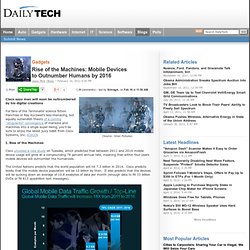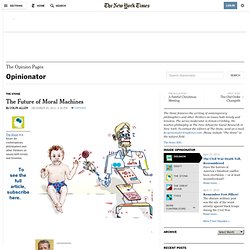

IBM Next 5 in 5: 2011. THE FUTURIST Magazine's Ten Favorite Predictions for 2011. Our interaction with the future—as individuals, groups, and nations—is an expression of both personal and national identity.

Regardless of what may or may not happen, the future as idea continues to shape buying, voting, and social behavior. We interact with the future in a myriad of ways, but none is more conspicuous than the prediction. With that it mind, the editors of THE FUTURIST magazine assembled a list of the best predictions we read in 2011 , published in the January-February 2012 issue included more than 70 from sources in government, business, and the occasional celebrity; herewith are our top 10 selections. What makes a prediction a good one? We struggled with the question. These statements do not paint a full portrait of the future, nor are they intended to. With no further ado, here they are: 1. Who: Jerome C. Why Great: Scientists are expanding the tools available to solve a myriad of problems, from enhancing health to improving energy supplies. 2. BUT ... Read it: 3. 4. 5. Rise of the Machines: Mobile Devices to Outnumber Humans by 2016.
(Source: Orion Pictures) Cisco says man will soon be outnumbered by his digital creations For fans of the Terminator science fiction franchise or Ray Kurzweil's less-menacing, but equally outlandish theory of a coming "singularity" convergence of mankind and machines into a single super-being, you'll be sure to enjoy the latest juicy tidbit from Cisco Systems, Inc.

(CSCO). I. 6 Unexpected Internet Trends for 2012. As we say “good riddance” to 2011, we must, as tradition dictates, look ahead to 2012.

You may be saying, “Predictions tend to be way too predictable, too more of the same.” Some of the predictions for 2012 are as such: The Cloud will grow even larger in 2012, Facebook will get even more ad revenue and Amazon will devour the rest of the civilized world. So, what else is new? Well, here are six things from all of the countless stories predicting what will happen in 2012 that could be of relevance to the investor, and they’re certainly not more of the same. New New Media on Steroids Mark Anderson, editor of the Strategic News Service, argues persuasively in a Forbes guest column that people are now ready to pay for a broader range of online content. Tech Trends You'll See in 2012. We’re living in an exciting time in technology: From consumer products such as phones and tablets to the way your home computer accesses the Internet, everything is changing, and mostly for the better.

We predict that next year the following ten developments will change the way you interact with the digital world. 1. Dual-Core Processors Become the Norm in Smartphones In 2011, the Motorola Atrix and the Droid Bionic were the first commercially popular smartphones to sport dual-core processors. In the fall, Apple’s iPhone 4S followed suit--and now it seems unlikely that any smartphones unveiled in 2012 will be competitive unless they can offer the same processing power that Apple’s phones do.
As a result, you should expect to see a surge in dual-core mobile devices. The Future of Moral Machines. The Stone is a forum for contemporary philosophers and other thinkers on issues both timely and timeless.

A robot walks into a bar and says, “I’ll have a screwdriver.” A bad joke, indeed. But even less funny if the robot says “Give me what’s in your cash register.” The fictional theme of robots turning against humans is older than the word itself, which first appeared in the title of Karel Čapek’s 1920 play about artificial factory workers rising against their human overlords. Just 22 years later, Isaac Asimov invented the “Three Laws of Robotics” to serve as a hierarchical ethical code for the robots in his stories: first, never harm a human being through action or inaction; second, obey human orders; last, protect oneself. Machines are increasingly operating with minimal human oversight in the same physical spaces as we do.
The prospect of machines capable of following moral principles, let alone understanding them, seems as remote today as the word “robot” is old. Leif Parsons.